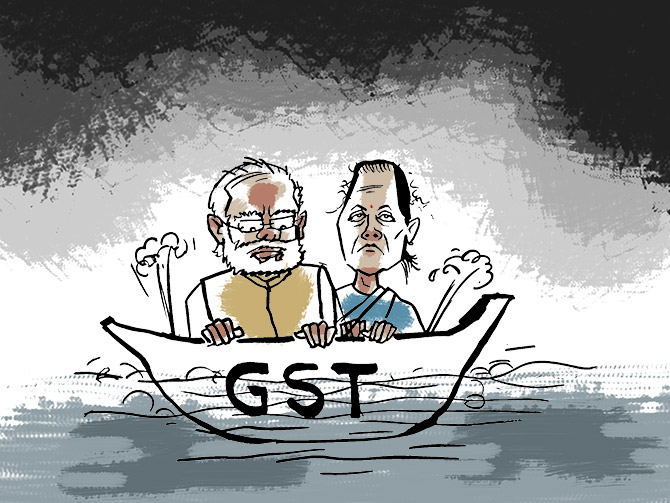The collections stood at Rs 98,202 crore in the month, against Rs 1.02 trillion in July. The figures indicate continuation of economic slow down which was reflected in the gross domestic product (GDP) growth which plummeted to a 25-quarter low of 5 per cent in the first quarter of 2019-20, experts said.
Illustration: Dominic Xavier/Rediff.com.

Goods and services tax (GST) collections failed to touch Rs 1 trillion in August, which experts say may guide the Centre and states on rate cut demands from slowing segments of the economy at their meeting later this month.
The collections stood at Rs 98,202 crore in the month, against Rs 1.02 trillion in July. The figures indicate continuation of economic slow down which was reflected in the gross domestic product (GDP) growth which plummeted to a 25-quarter low of 5 per cent in the first quarter of 2019-20, experts said.
This was the second month in the current fiscal year that the collections could not hit the Rs 1-trillion mark, the first being June.
However, collections rose 4.5 per cent year-on-year over Rs 93,960 crore in August, 2018.
All major collections under GST recorded lower collections in August, as compared to July.
The Central GST (CGST) stood at Rs 17,733 crore in August against Rs 17,912 crore in the previous month, while state GST (SGST) at Rs 24,239 crore against Rs 25,008 crore.
Similarly, integrated GST fell to Rs 48,958 crore in August against Rs 50,612 crore in July. However, the IGST collected from imports was higher in August at Rs 24,818 crore against Rs 24,246 crore in the previous month.
The compensation cess collected in August was also lower at Rs 7,273 crore in August against Rs 8,551 crore in the previous month.
Returns filed were a bit higher at 7.58 million in August against 7.57 million in the previous month.
Abhishek Jain, partner at EY, said the GST figures in August may be linked to the general slowdown in the industry.
“The revenue collections in August may be a factor of consideration in the rate cut agenda, if any in the upcoming council meeting,” he said.
Pratik Jain, partner at PwC India, said slowdown in GST collections perhaps reflects the economic realities on the ground.
“Given the slowdown in collections, it would be interesting to see if GST council would consider rate cuts in its meeting, later this month, for automobile sector as the industry has been pushing for,” he said.
Amid the demand for cut in the rates for the auto sector, the Council would meet on September 19 and 20 in Goa. The main meeting is on the second day, while officers will meet a day before.
The demand has assumed importance after the GST growth crashed to over six-year low in the first quarter of 2019-20.
The private final consumption expenditure (PFCE), denoting demand in the economy, grew by a 17-quarter low of 3.1 per cent in the quarter.
The government has settled at Rs 23,165 crore to CGST and Rs 16,623 crore to SGST from IGST as regular settlement. After this, total GST revenues collected by the Centre stood at Rs 40,898 crore and those by the states at Rs 40,862 crore in August.
The GST collections by the Centre has to be Rs 43,833 crore a month to meet the target of Rs 5.26 trillion in the Budget Estimates for 2019-20.
States were released Rs 27,955 crore from the compensation cess for June and July.
GST collections grew by 6.38 per cent in the first five months of the current financial year compared to the corresponding month of the previous year. The domestic component of GST rose by 9.11 per cent. In these months, while the one on imports fell by 1.43 per cent.